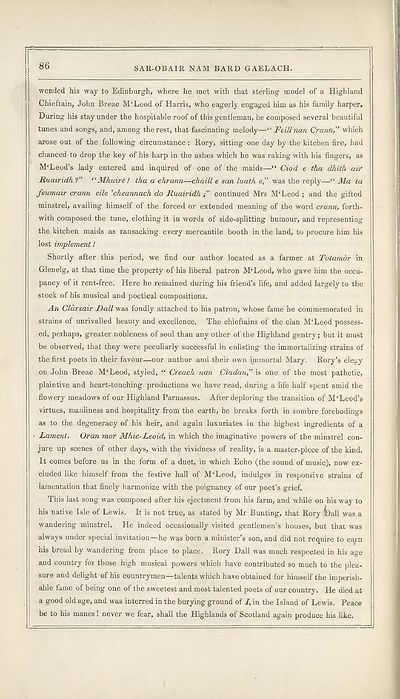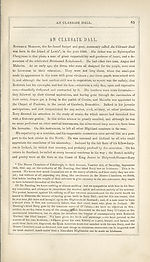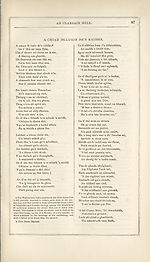Books and other items printed in Gaelic from 1871 to 1900 > Sar-obair nam bard Gaelach, or, The beauties of Gaelic poetry, and lives of the Highland bards
(166) Page 86
Download files
Complete book:
Individual page:
Thumbnail gallery: Grid view | List view

j 86 SAR-OBAIR NAM BARD GAELACH.
wended his way to Edinburgh, where he met with that sterling model of a Highland
Chieftain, John Breae M‘Leod of Harris, who eagerly engaged him as his family harper.
During his stay under the hospitable roof of this gentleman, he composed several beautiful
tunes and songs, and, among the rest, that fascinating melody—“ Feill nan Crann,” which
arose out of the following circumstance : Rory, sitting one day by the kitchen fire, had
chanced to drop the key of his harp in the ashes which he was raking with his fingers, as
M'Leod’s lady entered and inquired of one of the maids—“ Ciod e tha dhith air
Ruairidh ?” “Mhuire ! tha a chrann—chaill e san luath e," was the reply—“ Ma ta
feumair crann eile ’cheannach do Ruairidh continued Mrs M'Leod; and the gifted
minstrel, availing himself of the forced or extended meaning of the word crann, forth¬
with composed the tune, clothing it in words of side-splitting humour, and representing
the kitchen maids as ransacking every mercantile booth in the land, to procure him his
lost implement 1
Shortly after this period, we find our author located as a farmer at Totambr in
Glenelg, at that time the property of his liberal patron M‘Leod, who gave him the occu¬
pancy of it rent-free. Here he remained during his friend’s life, and added largely to the
stock of his musical and poetical compositions.
An Cldrsair Dali was fondly attached to his patron, whose fame he commemorated in
strains of unrivalled beauty and excellence. The chieftains of the clan M'Leod possess¬
ed, perhaps, greater nobleness of soul than any other of the Highland gentry; but it must
be observed, that they were peculiarly successful in enlisting the immortalizing strains of
the first poets in their favour—our author and their own immortal Mary. Rory’s elegy
on John Breac M‘Leod, styled, “ Creach nan Ciadan,” is one of the most pathetic,
plaintive and heart-touching productions we have read, during a life half spent amid the
flowery meadows of our Highland Parnassus. After deploring the transition of M'Leod's
virtues, manliness and hospitality from the earth, he breaks forth in sombre forebodings
as to the degeneracy of his heir, and again luxuriates in the highest ingredients of a
• Lament. Oran mor Mhic-Leoid, in which the imaginative powers of the minstrel con¬
jure up scenes of other days, with the vividness of reality, is a master-piece of the kind.
It comes before us in the form of a duet, in which Echo (the sound of music), now ex¬
cluded like himself from the festive hall of M‘Leod, indulges in responsive strains of
lamentation that finely harmonize with the poignancy of our poet’s grief.
This last song was composed after his ejectment from his farm, and while on his way to
his native Isle of Lewis. It is not true, as stated by Mr Bunting, that Rorydball was a
wandering minstrel. He indeed occasionally visited gentlemen’s houses, but that was
always under special invitation—he was born a minister’s son, and did not require to earn
his bread by wandering from place to place. Rory Dali was much respected in his age
and country for those high musical powers which have contributed so much to the plea¬
sure and delight of his countrymen—talents w’hich have obtained for himself the imperish¬
able fame of being one of the sweetest and most talented poets of our country. He died at
| a good old age, and was interred in the burying ground of I, in the Island of Lewis. Peace
| be to his manes! never we fear, shall the Highlands of Scotland again produce his like.
wended his way to Edinburgh, where he met with that sterling model of a Highland
Chieftain, John Breae M‘Leod of Harris, who eagerly engaged him as his family harper.
During his stay under the hospitable roof of this gentleman, he composed several beautiful
tunes and songs, and, among the rest, that fascinating melody—“ Feill nan Crann,” which
arose out of the following circumstance : Rory, sitting one day by the kitchen fire, had
chanced to drop the key of his harp in the ashes which he was raking with his fingers, as
M'Leod’s lady entered and inquired of one of the maids—“ Ciod e tha dhith air
Ruairidh ?” “Mhuire ! tha a chrann—chaill e san luath e," was the reply—“ Ma ta
feumair crann eile ’cheannach do Ruairidh continued Mrs M'Leod; and the gifted
minstrel, availing himself of the forced or extended meaning of the word crann, forth¬
with composed the tune, clothing it in words of side-splitting humour, and representing
the kitchen maids as ransacking every mercantile booth in the land, to procure him his
lost implement 1
Shortly after this period, we find our author located as a farmer at Totambr in
Glenelg, at that time the property of his liberal patron M‘Leod, who gave him the occu¬
pancy of it rent-free. Here he remained during his friend’s life, and added largely to the
stock of his musical and poetical compositions.
An Cldrsair Dali was fondly attached to his patron, whose fame he commemorated in
strains of unrivalled beauty and excellence. The chieftains of the clan M'Leod possess¬
ed, perhaps, greater nobleness of soul than any other of the Highland gentry; but it must
be observed, that they were peculiarly successful in enlisting the immortalizing strains of
the first poets in their favour—our author and their own immortal Mary. Rory’s elegy
on John Breac M‘Leod, styled, “ Creach nan Ciadan,” is one of the most pathetic,
plaintive and heart-touching productions we have read, during a life half spent amid the
flowery meadows of our Highland Parnassus. After deploring the transition of M'Leod's
virtues, manliness and hospitality from the earth, he breaks forth in sombre forebodings
as to the degeneracy of his heir, and again luxuriates in the highest ingredients of a
• Lament. Oran mor Mhic-Leoid, in which the imaginative powers of the minstrel con¬
jure up scenes of other days, with the vividness of reality, is a master-piece of the kind.
It comes before us in the form of a duet, in which Echo (the sound of music), now ex¬
cluded like himself from the festive hall of M‘Leod, indulges in responsive strains of
lamentation that finely harmonize with the poignancy of our poet’s grief.
This last song was composed after his ejectment from his farm, and while on his way to
his native Isle of Lewis. It is not true, as stated by Mr Bunting, that Rorydball was a
wandering minstrel. He indeed occasionally visited gentlemen’s houses, but that was
always under special invitation—he was born a minister’s son, and did not require to earn
his bread by wandering from place to place. Rory Dali was much respected in his age
and country for those high musical powers which have contributed so much to the plea¬
sure and delight of his countrymen—talents w’hich have obtained for himself the imperish¬
able fame of being one of the sweetest and most talented poets of our country. He died at
| a good old age, and was interred in the burying ground of I, in the Island of Lewis. Peace
| be to his manes! never we fear, shall the Highlands of Scotland again produce his like.
Set display mode to: Large image | Transcription
Images and transcriptions on this page, including medium image downloads, may be used under the Creative Commons Attribution 4.0 International Licence unless otherwise stated. ![]()
| Permanent URL | https://digital.nls.uk/109811065 |
|---|
| Description | Out-of-copyright books printed in Gaelic between 1631 and 1900. Also some pamphlets and chapbooks. Includes poetry and songs, religious books such as catechisms and hymns, and different editions of the Bible and the Psalms. Also includes the second book ever published in Gaelic in 1631. |
|---|

